The AnandTech Coffee Lake Review: Initial Numbers on the Core i7-8700K and Core i5-8400
by Ian Cutress on October 5, 2017 9:00 AM EST- Posted in
- CPUs
- Intel
- Core i5
- Core i7
- Core i3
- 14nm
- Coffee Lake
- 14++
- Hex-Core
- Hyperthreading
Benchmarking Performance: CPU Encoding Tests
One of the interesting elements on modern processors is encoding performance. This includes encryption/decryption, as well as video transcoding from one video format to another. In the encrypt/decrypt scenario, this remains pertinent to on-the-fly encryption of sensitive data - a process by which more modern devices are leaning to for software security. Video transcoding as a tool to adjust the quality, file size and resolution of a video file has boomed in recent years, such as providing the optimum video for devices before consumption, or for game streamers who are wanting to upload the output from their video camera in real-time. As we move into live 3D video, this task will only get more strenuous, and it turns out that the performance of certain algorithms is a function of the input/output of the content.
All of our benchmark results can also be found in our benchmark engine, Bench.
7-Zip 9.2: link
One of the freeware compression tools that offers good scaling performance between processors is 7-Zip. It runs under an open-source licence, is fast, and easy to use tool for power users. We run the benchmark mode via the command line for four loops and take the output score.
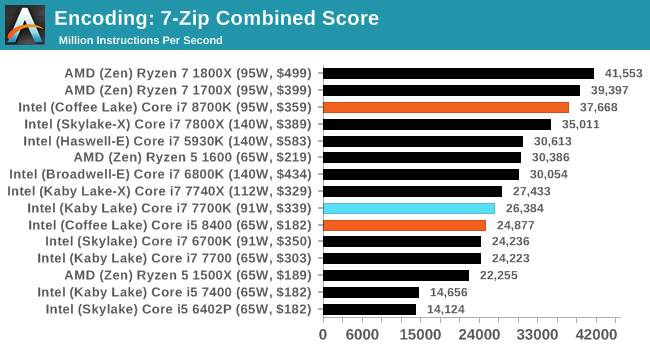
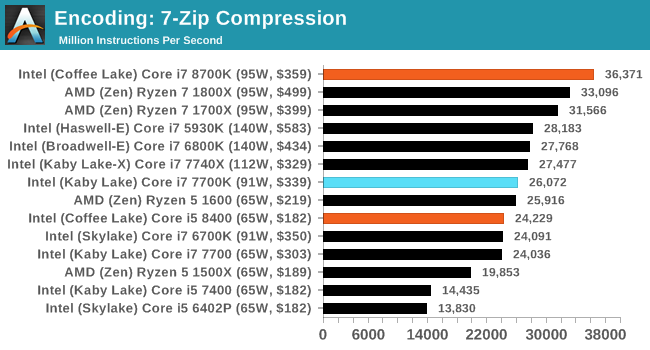
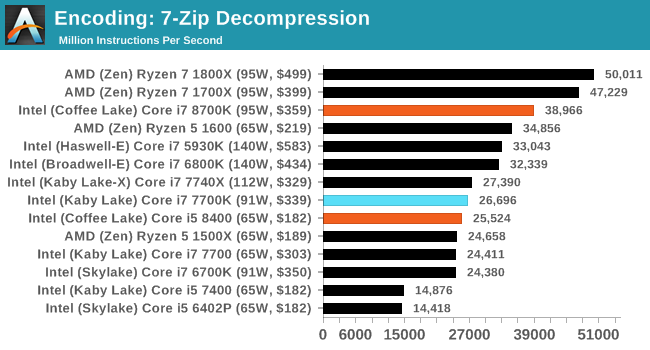
WinRAR 5.40: link
For the 2017 test suite, we move to the latest version of WinRAR in our compression test. WinRAR in some quarters is more user friendly that 7-Zip, hence its inclusion. Rather than use a benchmark mode as we did with 7-Zip, here we take a set of files representative of a generic stack (33 video files in 1.37 GB, 2834 smaller website files in 370 folders in 150 MB) of compressible and incompressible formats. The results shown are the time taken to encode the file. Due to DRAM caching, we run the test 10 times and take the average of the last five runs when the benchmark is in a steady state.
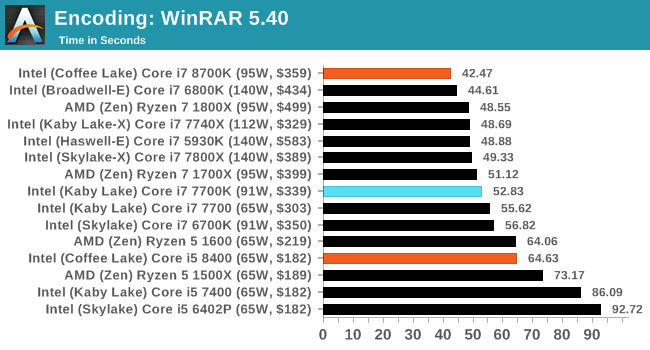
AES Encoding
Algorithms using AES coding have spread far and wide as a ubiquitous tool for encryption. Again, this is another CPU limited test, and modern CPUs have special AES pathways to accelerate their performance. We often see scaling in both frequency and cores with this benchmark. We use the latest version of TrueCrypt and run its benchmark mode over 1GB of in-DRAM data. Results shown are the GB/s average of encryption and decryption.
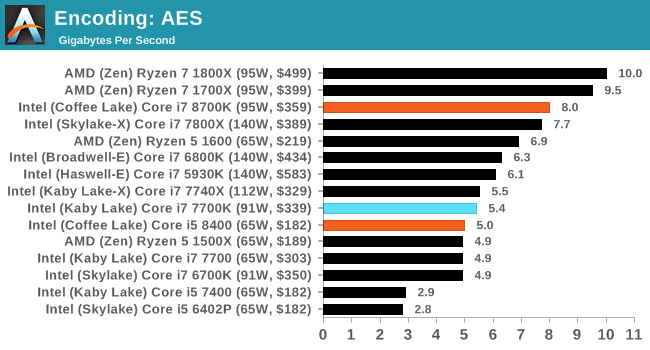
HandBrake v1.0.2 H264 and HEVC: link
As mentioned above, video transcoding (both encode and decode) is a hot topic in performance metrics as more and more content is being created. First consideration is the standard in which the video is encoded, which can be lossless or lossy, trade performance for file-size, trade quality for file-size, or all of the above can increase encoding rates to help accelerate decoding rates. Alongside Google's favorite codec, VP9, there are two others that are taking hold: H264, the older codec, is practically everywhere and is designed to be optimized for 1080p video, and HEVC (or H265) that is aimed to provide the same quality as H264 but at a lower file-size (or better quality for the same size). HEVC is important as 4K is streamed over the air, meaning less bits need to be transferred for the same quality content.
Handbrake is a favored tool for transcoding, and so our test regime takes care of three areas.
Low Quality/Resolution H264: Here we transcode a 640x266 H264 rip of a 2 hour film, and change the encoding from Main profile to High profile, using the very-fast preset.
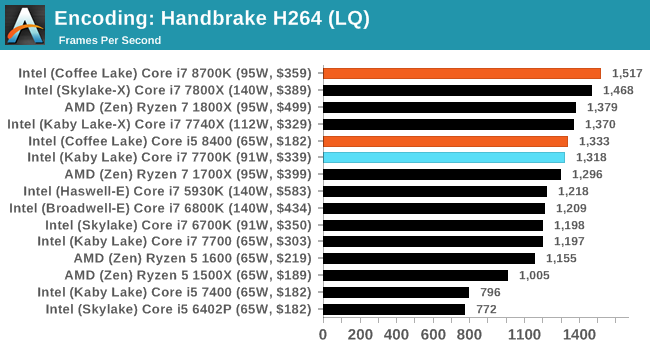
High Quality/Resolution H264: A similar test, but this time we take a ten-minute double 4K (3840x4320) file running at 60 Hz and transcode from Main to High, using the very-fast preset.
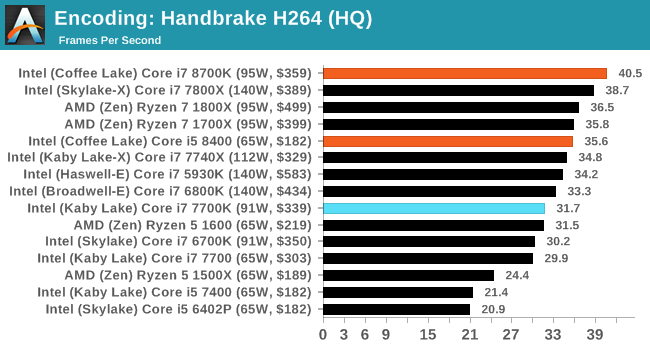
HEVC Test: Using the same video in HQ, we change the resolution and codec of the original video from 4K60 in H264 into 4K60 HEVC.
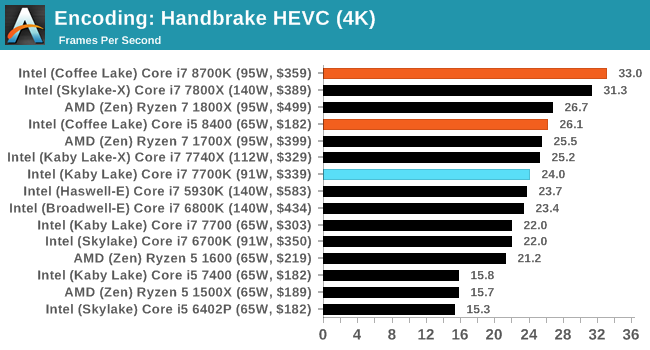










222 Comments
View All Comments
mapesdhs - Friday, October 6, 2017 - link
Any idea what that optimisation is? Seems odd that adding extra pure cores would harm performance, as opposed to adding HT which some games don't play nice with. Otherwise, are you saying that for this test, if it was present, the i3 8100 would come out on top? Blimey.Ian Cutress - Saturday, October 7, 2017 - link
They're either doing something to align certain CPU tasks for AVX, or it's bypassing code. You'd have to ask the developers on that.mapesdhs - Monday, October 9, 2017 - link
I doubt they'd explain what's happening, might be proprietory code or something.WickedMONK3Y - Thursday, October 5, 2017 - link
You have the spec of the i7 8700K slightly wrong. It has a base frequency of 3.7GHz not 3.8GHz.https://ark.intel.com/products/126684/Intel-Core-i...
Ian Cutress - Thursday, October 5, 2017 - link
Mistake on our part. I was using our previous news post as my source and that had a Typo. This review (and that news) should be updated now.Slomo4shO - Thursday, October 5, 2017 - link
Ian, this is probably your worst review to date. Lackluster choice of CPUs, mid-grade GPU, and lack of direct competition in the product stack... Why would you not use a GTX 1080 Ti or Titan XP?Ian Cutress - Thursday, October 5, 2017 - link
All the CPUs we've ever tested are in Bench. Plenty of other data in there: the goal was to not put 30+ CPUs into every graph.Our benchmark database includes over 40 CPUs tested on the GTX 1080, which is the most powerful GPU I could get a set of so I can do parallel testing across several systems. If that wasn't enough (a full test per CPU takes 5 hours per GPU), the minute I get better GPUs I would have to start retesting every CPU. At the exclusion of other content. Our benchmark suite was updated in early Q2, and we're sticking with that set of GPUs (GTX 1080/1060/R9 Fury/RX 480) for a good while for that reason.
Note I had three days to do this review.
crimson117 - Thursday, October 5, 2017 - link
Good job! More people need to know about the bench...Slomo4shO - Thursday, October 5, 2017 - link
To be fair the R5 1600 was added to the benches after the fact. In addition, your othwr reviews tend to be much more detailed and data driven with relevant products and multiple GPUs.Why would I read your review if you expect me to dig through your benchmark to obtain relivant data?
I can understand and appreciate the time crunch but it is a poor excuse for some of the decisions made in this review.
Take it with a grain of salt, this was not your best work.
mapesdhs - Friday, October 6, 2017 - link
Ooohhh the effort of examing the data in Bench! :D First world problems. Sheesh...Run your own tests then, see how you get on with having a life. It's insanely time consuming.